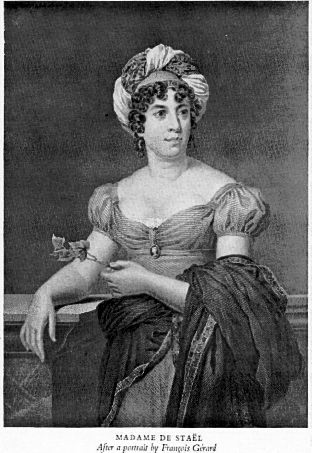Liberty Matters
Against Machiavelli: The Question of Selfishness

I am grateful to Professor Craiutu for his answer to the "thought experiment" I suggested earlier this month. By linking the concept enthusiasm to Staël's cosmopolitanism, both Aurelian Craiutu and Catriona Seth have made a convincing point: welcoming the variety of beliefs and opinions that prevail around the world gives us a better chance of avoiding the frightening excesses of political fanaticism. Although the point I am about to make will probably sound somewhat trivial to my distinguished colleagues – who, without a doubt, long ago adopted Staël's cosmopolitanism, open-mindedness, and distaste for one-size-fits-all solutions to complex intellectual problems – it appears that Staël's lesson is indeed relevant for our time, especially in the United States where the staggering disappearance of language programs from numerous universities across the nation is hindering the diffusion of what Craiutu calls the "openness toward the world, combined with an appreciation for the plurality of cultures, institutions, mores, and customs." Each of these closings contribute to the intellectual impoverishment of the wealthiest nation in the world by reducing the available cultural currency.[106]
In two successive posts, I would like to explore a little more what Aurelian Craiutu suggested regarding Staël's refusal of a form of intellectual reductionism that adopts a single concept as the touchstone to judge principles, actions, and individuals. More precisely, I would like to underline her refusal of Machiavellianism. The Prince (1532) has diffused a forceful, yet highly problematic definition of politics as the art of gaining and maintaining power without any regard for the immorality of the means employed to achieve those two ends. This form of extreme pragmatism – the value of any political decision derives from its capacity to help the acquisition and conservation of power – holds all the warning signs of monism (a term I am using after Professor Craiutu borrowed it from Isaiah Berlin). In his last post, Aurelian Craiutu indeed underlined that Staël conceived fanaticism as an attempt to derive everything from one idea – whether it be liberty, equality, inequality, duty, virtue, property, nation, or noninterference. The idea of efficiency can be added to this list and the name Machiavelli to those of Marx, Adam Smith, and the Founding Fathers, whom other monists have heralded in the past or are still invoking today to justify their decisions. "Timeo hominem unius libri": "I fear the man of a single book." No doubt Staël would have agreed with this phrase attributed to Saint Thomas Aquinas, as the "man of a single book" may very well become obsessed with a single idea and, to quote Aurelian Craiutu again, "reduce the diversity of the world to one dimension and judge everything else in light of it." In particular, The Prince would have never become Staël's personal book of reference because of its clear antinomy with her concept enthusiasm and the values that underpin it. Two reasons can explain Staël's stance regarding Machiavelli's magnum opus: first, this work deconstructs the equivalence between selfishness and evil that Plato established in The Republicthrough the dialogue between Socrates and Thrasymachus; second, Staël identified Machiavelli's political thought as a clear influence on Napoleon's style of government.
Previous posts have already explored the concept enthusiasm in Staël's political thinking and, in particular, insisted that one of the main characteristics of this "disposition of the soul" consists in encouraging individuals to sacrifice their personal interests for the greater good. Far from seeing the sacrifice of one's life as a grandiose gift, The Prince asserted that the preservation of one's life is a priority: "for Machiavelli what is politically virtuous will first of all answer to the needs of security, stability, duration."[107] Indeed, Machiavelli's work is deprived of any sort of idealism: it aspires to describe mankind and politics as they truly are rather than as they ought to be. Starting with a pessimistic understanding of human nature which involves the certainty that appetites are aggressive and untamable and that people are fundamentally evil (which is an obvious common point with the Christian dogma of original sin), Machiavelli saw morality as "enlightened self-interest" and society as a "relatively safe arena of selfishness."[108] These definitions are diametrically opposite to Staël's conception of enthusiasm as the cure for political fanaticism and the best way to defeat selfish, vulgar penchants.
Endnotes
[106.] On this question, see the following article by Steve Johnson, "Colleges Lose a 'Stunning' 651 Foreign-Language Programs in 3 Years," <https://www.chronicle.com/article/Colleges-Lose-a-Stunning-/245526>.
[107.] Asher Horowitz, "Machiavelli, Political Morality and an 'Economy of Violence,'" <http://www.yorku.ca/horowitz/courses/lectures/19_machiavelli_economy_violence.html>.
[108.] Horowitz.
Copyright and Fair Use Statement
“Liberty Matters” is the copyright of Liberty Fund, Inc. This material is put on line to further the educational goals of Liberty Fund, Inc. These essays and responses may be quoted and otherwise used under “fair use” provisions for educational and academic purposes. To reprint these essays in course booklets requires the prior permission of Liberty Fund, Inc. Please contact oll@libertyfund.org if you have any questions.